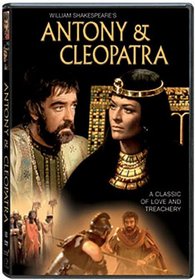| Actors: Richard Johnson, Janet Suzman, Rosemary McHale, Mavis Taylor Blake, Darien Angadi Director: Jon Scoffield Creator: William Shakespeare Genres: Indie & Art House, Drama, Television Sub-Genres: Indie & Art House, Love & Romance, Television Studio: Lions Gate Format: DVD - Color DVD Release Date: 06/22/2004 Original Release Date: 01/04/1975 Theatrical Release Date: 01/04/1975 Release Year: 2004 Run Time: 2hr 41min Screens: Color Number of Discs: 1 SwapaDVD Credits: 1 Total Copies: 0 Members Wishing: 4 MPAA Rating: Unrated Languages: English |
Search - Antony and Cleopatra on DVD
  | Antony and Cleopatra Actors: Richard Johnson, Janet Suzman, Rosemary McHale, Mavis Taylor Blake, Darien Angadi Director: Jon Scoffield Genres: Indie & Art House, Drama, Television UR 2004 2hr 41min Studio: Lions Gate Home Ent. Release Date: 06/22/2004 Run time: 161 minutes Rating: Nr |
Larger Image |
Movie DetailsSimilar Movies
Similarly Requested DVDs
|
Movie ReviewsBrilliant Performance! Tracy Marks | Arlington, MA USA | 04/21/2000 (5 out of 5 stars) "This is a brilliant performance of Antony and Cleopatra..... and I say this as a reader/viewer who normally likes to read but not watch Shakespeare. Janet Suzman as Cleopatra is at least as fine a Cleopatra as Liz Taylor (and infinitely superior to Leonor Varela's embarrassingly adolescent portrayal), but Richard Johnson as Antony is so marvelous that you can only think of Richard Burton as an unappealing weakling after watching Johnson. What a marvelous Antony - FINALLY you can begin to understand why Cleopatra loved him! And don't miss a younger Patrick Stewart as a very dramatically effective and engaging Enobarbus. This is a film that bears repeated watching; I've watched it three times in one week and will undoubtedly view it far more than most videos on my shelf. The staging and sets aren't noteworthy but you don't even need them because the acting (filmed very closeup) is so superb. This deserves to be a classic. Don't miss it." Great performances! Tracy Marks | 03/11/2002 (5 out of 5 stars) "I've seen this play on film and on stage, but this British television version is by far the best version I've seen. Richard Johnson seems to be EXACTLY the embodiment of Marc Antony that Shakespeare must have envisioned - pure poetry and agony. And Janet Suzman channels Cleopatra in a way that is almost spooky (Cleo lives!). I also personally love the set design, which is solely used to create the mood of the characters and plot. This is like a stage play, in that it allows the viewer to focus on the characters, not on locations (I'll leave that to the deeply inferior movie version that plays the story out like an over-produced historical document). Trevor Nunn proves that one doesn't need lavish productions in order to recreate great Shakespeare. Just get some great actors on an open set and let the magic happen!" This is most likely the best production of Shakespeare's An Vaughan Dawson | Delray Beach, FL United States | 11/14/2001 (5 out of 5 stars) "I'm not sure what the above reviewers were looking for, but I have had an English bootleg of this production for years, and have never seen a better one. Janet Suzman and Richard Johnson wowed all of the English critics when this RSC production was onstage. And Patrick Stewart won every supporting actor award that season. And, it's directed by the great Trevor Nunn. Nuff said! I'm glad to get a new DVD copy of this production. Any classical theater fan or Roman history buff needs to have this one in their collection." A fine production, but flawed The Baker Street Irregular | Staines | 02/18/2001 (3 out of 5 stars) "Shakespeare's plays are essentially theatrical, and difficult to bring off on screen. This production succeeds admirably in many respects. It doesn't go for visual spectacle: quite apart from anything else, it couldn't hope to compare on that score with the Hollywood Burton/Taylor extravaganza. Instead, with a minimum of props or sets, it focuses on the actors' faces, and on the verse. And when Patrick Stewart, as Enobarbus, describes Cleopatra's first meeting with Antony ("the barge she sat in, like a burnished throne..")the viewer's mind may conjure up for itself spectacles far more impressive than anything Hollywood has to offer. Shakespeare's Antony and Cleopatra are both middle-aged, looking back on past glories and haunted with the awareness of failing powers. They are among Shakespeare's greatest creations, and Johnson and Suzman capture superbly their complexities. Corin Redgrave's Octavius, however, is more controversial. Certainly, Octavius is a calculating politician: but should he really be so ice cold, and devoid of emotion? This presentation seriously unbalances the play. The wonderful scene where he expresses grief on hearing of Antony's death here passes for nothing, for we simply cannot believe that Octavius - as presented here - is capable of feeling anything at all.The other problem with this production is the text: most Shakespeare plays can stand a bit of judicious cutting, but the cuts here are so extensive, that the text is effectively mangled. Would another forty minutes or so really have over-taxed the viewer's attention span?"
|
















